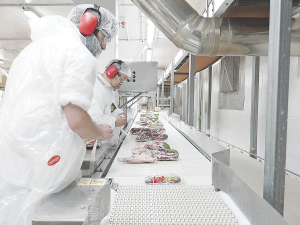Alliance Group chief executive steps down
Alliance Group chief executive Willie Wiese is leaving the company after three years in the role.
 Alliance Group chief executive Willie Wiese says current livestock pricing reflects what prices companies can capture in global markets.
Alliance Group chief executive Willie Wiese says current livestock pricing reflects what prices companies can capture in global markets.
Meat processor and exporter Alliance Group concedes it is facing tough global market conditions with both weaker demand and pricing.
In its latest newsletter to supplier/shareholders, chief executive Willie Wiese says, like all red meat exporters, Alliance's livestock pricing reflects what prices it can capture in global markets.
"Weaker market conditions are being driven by persistently high inflation levels reducing consumers' discretionary spending," he told suppliers. "This has led to a decline in people eating out in restaurants and some shoppers trading down from higher priced red meat proteins - such as lamb - in their weekly grocery shops."
Wiese added there were also consistently high levels of inventory across all proteins in various markets, which is driving down demand and the price for fresh product. However, he says Alliance's inventory is on a par with levels in previous years.
"The Chinese economy is recovering slower than anticipated following Covid-19 and consumers there are more cautious with their spending," Wiese explains. "Recent information out of China suggests the current slowdown in demand will continue through the short to medium term, which has led to us diversifying some products into other markets."
He adds that the situation is also compounded by Australia producing increased volumes of sheep meat and beef.
"We are doing everything we can to mitigate the pricing volatility by re-directing product away from China into other markets," Wiese told suppliers. "We are also ramping up capacity for our farmers as we head into a busy processing period for lambs and non-replacement calves."
Fonterra’s impending exit from the Australian dairy industry is a major event but the story doesn’t change too much for farmers.
Expect greater collaboration between Massey University’s school of Agriculture and Environment and Ireland’s leading agriculture university, the University College of Dublin (UCD), in the future.
A partnership between Torere Macadamias Ltd and the Riddet Institute aims to unlock value from macadamia nuts while growing the next generation of Māori agribusiness researchers.
A new partnership between Dairy Women’s Network (DWN) and NZAgbiz aims to make evidence-based calf rearing practices accessible to all farm teams.
Despite some trying circumstances recently, the cherry season looks set to emerge on top of things.
Changed logos on shirts otherwise it will be business as usual when Fonterra’s consumer and related businesses are expected to change hands next month.

OPINION: Here w go: the election date is set for November 7 and the politicians are out of the gate…
OPINION: ECan data was released a few days ago showing Canterbury farmers have made “giant strides on environmental performance”.